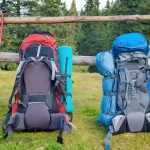

Zero-Waste Camping: Reduce, Reuse, and Recycle for a Greener Camping Experience
by
Sarah Patel
Are you a camping enthusiast who also cares deeply about the environment? If so, you’ll love the concept of zero-waste camping! Embracing a zero-waste mindset while camping means minimizing your impact on the environment by reducing, reusing, and recycling as much as possible. It’s a fantastic way to enjoy the great outdoors while being eco-conscious and practicing sustainable camping. In this blog post, we’ll explore the principles of zero-waste camping and how you can incorporate them into your next camping trip for a greener experience.
Reduce Your Waste
The first step in zero-waste camping is to reduce the amount of waste you generate while camping. Here are some practical tips to help you minimize your waste footprint:
- Plan ahead and pack mindfully: Bring only what you need and avoid single-use items. Opt for reusable camping gear such as stainless steel water bottles, utensils, and food containers. Say no to disposable plastic cutlery, straws, and plastic wrap.
- Choose sustainable food options: Pack food in reusable containers and avoid excess packaging. Opt for locally sourced and organic food when possible. Plan your meals to avoid food waste, and pack out any leftover food scraps.
- Use eco-friendly toiletries: Choose biodegradable and natural toiletries, such as soap, shampoo, and toothpaste. Avoid products that contain microbeads or harmful chemicals that can pollute the environment.
- Avoid disposable campfires: Instead of using single-use charcoal or fire starter logs, use a camp stove or a fire starter made from natural materials such as pinecones, twigs, or paper. Be sure to follow local fire regulations and use established fire rings or fire pans.
Reuse and Repurpose
The second principle of zero-waste camping is to reuse and repurpose items to extend their lifespan and reduce waste. Here are some ideas:
- Repair and maintain camping gear: Instead of buying new gear when something breaks, try to repair or repurpose it. For example, patch up a torn tent, fix a broken zipper, or resew a torn backpack strap. Regularly maintain your camping gear to prolong its lifespan and reduce the need for replacements.
- Bring reusable containers and bags: Use reusable containers, bags, and mesh produce bags for storing food, organizing gear, and collecting trash. Avoid single-use plastic bags and choose durable, reusable alternatives.
- Repurpose items for campfire kindling: Look for natural materials like small sticks, twigs, and pinecones as campfire kindling instead of purchasing fire starter logs or using newspaper. This reduces the need for additional waste and encourages the use of natural materials.
- Share and borrow gear: If you’re camping with friends or a group, consider sharing gear such as camping stoves, lanterns, or cookware. Borrowing or renting gear reduces the need for everyone to buy and bring their own, resulting in less waste and cost savings.
Recycle and Dispose Properly
The third principle of zero-waste camping is to recycle and dispose of waste properly. Here’s how you can do that:
- Sort and separate recyclables: If recycling facilities are available at your camping location, sort and separate recyclables such as plastic bottles, aluminum cans, glass, and paper. Follow local recycling guidelines and make sure to clean and rinse recyclables before placing them in the recycling bin.
- Pack out all trash: If there are no recycling facilities available, pack out all your trash and dispose of it properly in designated trash receptacles or bring it back home with you. Never leave trash or litter behind, as it can harm wildlife and pollute the environment
- Avoid burning or burying trash: Burning or burying trash is not a sustainable or responsible way to dispose of waste while camping. It can release harmful toxins into the air or soil and disturb the natural ecosystem. Always pack out your trash and dispose of it properly in designated areas.
- Practice Leave No Trace principles: Follow the Leave No Trace principles, which are guidelines for minimizing impact on the environment while camping. These principles include packing out all trash, leaving natural and cultural features undisturbed, and disposing of human waste properly. Be sure to educate yourself about local regulations and guidelines for waste disposal in the camping area you are visiting.
Incorporate Sustainable Camping Practices
In addition to the principles of zero-waste camping, there are other sustainable camping practices you can incorporate into your camping routine for a greener experience:
- Choose eco-friendly campsites: Look for campsites that follow sustainable practices, such as recycling programs, composting, and use of renewable energy sources. Research and choose campsites that are certified or recognized for their sustainability efforts.
- Conserve water: Use water sparingly while camping by taking shorter showers, turning off taps when not in use, and using biodegradable soap and shampoo to minimize water pollution. Collect rainwater for cooking, cleaning, and washing dishes if possible.
- Leave nature untouched: Respect the natural environment by staying on designated trails, not disturbing wildlife or plant life, and avoiding unnecessary markings or carvings on trees or rocks. Leave nature as you found it and do not disturb or remove any natural or cultural features.
- Educate others: Spread awareness about sustainable camping practices by sharing your knowledge and encouraging others to follow eco-friendly camping practices. Lead by example and inspire others to adopt environmentally responsible habits while camping.
Conclusion
Zero-waste camping is a wonderful way to enjoy the great outdoors while minimizing your environmental impact. By following the principles of reduce, reuse, and recycle, as well as incorporating other sustainable camping practices, you can make a positive difference in protecting the environment and leaving no trace behind. Remember to plan ahead, pack mindfully, reuse and repurpose items, recycle and dispose of waste properly, and incorporate sustainable camping practices into your routine. Let’s strive for greener camping experiences and help preserve our beautiful natural surroundings for future generations to enjoy.
For more information on sustainable camping practices, visit this page.
Author

Sarah Patel
Sarah is a travel writer and photographer, with a passion for exploring new destinations and cultures. She's traveled extensively throughout the world and has written for several major travel publications. Sarah is also an avid camper and outdoor enthusiast, and loves to combine her love of travel with her love of the outdoors. She's always on the lookout for unique and off-the-beaten-path campsites
Recent Posts


